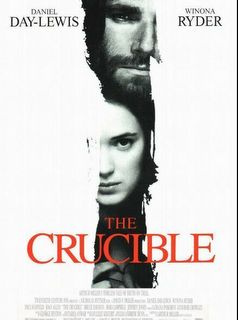 StinkyLulu confesses to being more than a little shocked to discover just how contemporary The Crucible would feel in 2006, more than fifty years after its original theatrical staging and ten years since its first major Hollywood production. Yet, Arthur Miller's social allegory of American political hysteria/hypocrisy retains a shockingly contemporary relevance. With lines like "You are either with this court or you are against it"... With dramatic sequences in which a presiding judge finagles legal rules of evidence and testimony because of the extraordinary nature of the "threat to this court"... Suffice it, in 2006, The Crucible ain't just about McCarthyism anymore...
StinkyLulu confesses to being more than a little shocked to discover just how contemporary The Crucible would feel in 2006, more than fifty years after its original theatrical staging and ten years since its first major Hollywood production. Yet, Arthur Miller's social allegory of American political hysteria/hypocrisy retains a shockingly contemporary relevance. With lines like "You are either with this court or you are against it"... With dramatic sequences in which a presiding judge finagles legal rules of evidence and testimony because of the extraordinary nature of the "threat to this court"... Suffice it, in 2006, The Crucible ain't just about McCarthyism anymore...Indeed, for the purposes of Supporting Actress Sundays, it's all about...
Arthur Miller structures the world of The Crucible -- both in his 1952 stage play and his 1996 screenplay -- fairly simply. Colonial Salem becomes -- by brute force of accusation -- a community cleaved into three groups, hopelessly at odds. As the narrative progresses, these groups form increasingly distinct ensembles: the accusers (the young women & girls enflamed with extraordinary passions), the accused (the mostly mature women accused of witchery and consorting with the devil), & the adjudicators (exclusively male public authorities -- landowners, clergy, lawyers, politicians -- charged with asserting the divine truth). Only John Proctor (Daniel Day-Lewis) really travels among all of these ensembles, and it's the intimate triangle of Abigail Williams (Winona Ryder), John Proctor (Day-Lewis) & Elizabeth Proctor (Allen) that creates the emotional (as opposed to social) dramaturgy of the piece.
Joan Allen as Elizabeth Proctor anchors the most interesting of these three opposed ensembles, the mostly mature actresses offering vivid and precise performances as -- in most cases -- the variously accused. This ensemble includes: Frances Conroy, as the desperation-riven Ann Putnam; Elizabeth Patterson (as Rebecca Nurse) and Mary Pat Gleason as (Martha Corey) who see the madness coming and stand resolute amidst its fury; & the legendary Ruth Maleczech (in a rare screen appearance) as Goody Osbourne, among the first accused and first hanged. (Even Charlayne Woodard contributes a welcome cynicism in the thankless role of Tituba). Among these women, as Goody Proctor, Joan Allen displays the strange accumulation of strengths -- the porcelain façade girded with steely integrity; plausible plainness despite extraordinary beauty; uncorseted contemporary intelligence/humor, even in "period" roles -- that have made her one of Oscar's most reliable contenders (unable to avoid unfortunate pun).
"Suspicion kissed you when I did... It were a cold house I kept."
Perhaps Lulu's most favorite line from an Arthur Miller play
Perhaps Lulu's most favorite line from an Arthur Miller play
Allen's performance is clearly the stand-out among the principal performances, perhaps also the only one to truly stand up ten years later. It's a curious thing to watch. Reknowned theatre director, Nicholas Hytner -- in this, only his 2nd film -- directs with a garish enthusiasm for wacky camera angles. It's up Winona's nose here, atop Daniel's head there, bitch-smacking Bruce Davison again and again. And then -- screech -- stand-still stop for Paul Scofield's ponderous sublety. It does becomes silly after a time. Yet, through it all, Joan Allen's always doing just fine -- the camera never catches her wrong. She's never doing too much or too little, & her unusual features convey whatever's necessary from whatever angle. From far away, she's heart-stopping; right up close, she's wrenching. And she's never off-pitch in this movie which seems ever in search of its tone. This might possibly be Allen's greatest gift to any project. The rest of the production might just tear away, but somehow Allen's always got her corner of the tent securely grounded.
All that being said, with so much to admire in Joan Allen's work here, it's strange that there's so little left to love. It's characteristically strong work from one of the most reliable actresses of the last two decades in precisely the kind of role (devoted helpmeet) that Oscar tends to notice. (Is that "faint praise"?) So, while much warranted, the nomination remains somehow not too too interesting. Curious, that...
Apologies for any photo-problems. Sunday morning seems to be a tough time for Blogger; it's having "issues" again.






No comments:
Post a Comment